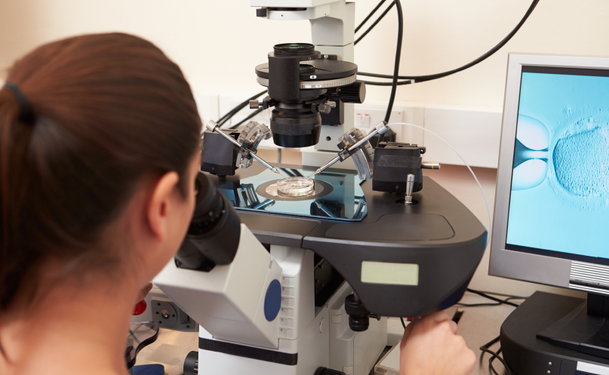Primary care physicians, OB/GYNs and urologists are generally capable of dealing with basic infertility issues. They can conduct basic blood tests, monitor ovulation, and perform sperm health and post intercourse tests to determine any underlying physical conditions that may be preventing you from becoming pregnant. These doctors may also be able to prescribe fertility drugs — hormone treatments that help women overcome many basic reproductive issues.
If these basic steps do not lead to a pregnancy, however, this is when you may need the expertise of a fertility specialist or a reproductive endocrinologist (also called a RE). An RE is a physician specially trained in reproductive medicine addressing hormonal functioning as it pertains to reproduction.
What is a reproductive endocrinologist
Infertility specialists are typically OB/GYNs with extra training in reproductive disorders and endocrine issues. A regular OB/GYN typically receives about three to four months of infertility training during their residencies, but a RE has typically spent seven years outside of medical school learning specifically about reproductive issues.
Board approved, board certified – What is the difference?
In the United States, the American College of Obstetricians and Gynecologists (ACOG) require REs to have four years of training as OB/GYNs, and then complete an additional three to four years of a focused, intense fellowship in the sub-specialty of reproductive and fertility issues. Once an OB/GYN has completed the fellowship, they are considered "board approved," which means they are eligible to take the board examinations given by the ABOG.
A board certified RE has spent anywhere from seven to 10 years training and then going through rigorous board examinations to become certified by the American Board of Obstetrics and Gynecologists (ABOG). After that, REs also have to maintain their certification through reviews and periodic re-testing to make sure they are in touch with the best practices of their field.
Not all reproductive endocrinologists are board certified, for various reasons including the amount of time necessary to obtain, and maintain certification.
Finding a fertility specialist
If you are planning to visit an infertility specialist to explore more rigorous solutions to your fertility issues, you may feel overwhelmed by all of the new information. Your primary care physician may be able to provide some guidance. It is also a good idea to do a bit of homework about your infertility specialist, and the variety of treatments available.
At a minimum, use the ACOG/ABOG websites to make sure the RE is an OB/GYN who is board approved — if not certified. After that, do a quick check on the clinic your doctor works for, too. If it is one of the 90% approved for quality, safety and patient care by the , you can be secure in the knowledge that you are starting off your treatment with the best quality of care and the best infertility specialist for your needs.
Updated August 2014


